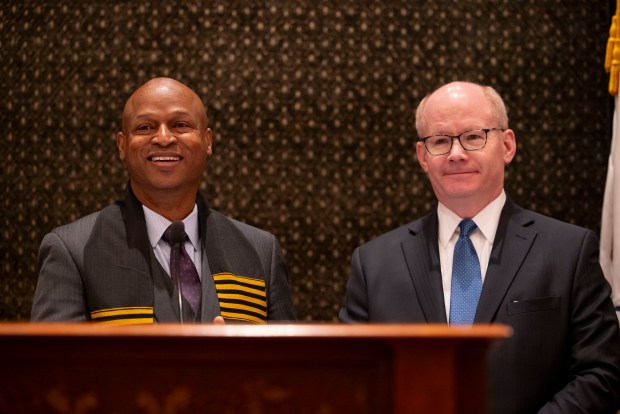Democratic justices on the Illinois Supreme Court are so hopelessly mired in conflicts of interest on partisan issues that they must recuse themselves from all such proceedings, including the present case to overturn what are arguably the nation’s most gerrymandered legislative districts.
Some background. For many years before he became defrocked, Chicago Ald. Ed Burke chaired the Democratic Party of Cook County judicial endorsement committee. A good word from Burke in the committee “made” scores of judges, as endorsement in heavily Democratic Cook County was tantamount to election. Even Burke’s wife was elevated to the state high court by the process.
So tight was the relationship between Burke and the state high court that four of the seven justices recused themselves from the easy-as-pie issue as to whether Burke should lose his law license following his conviction on federal felony charges.
Outside Cook County, then-Illinois House Speaker Michael Madigan, who was also chair of the Illinois Democratic Party, contributed millions to elect downstater Tom Kilbride and help him retain his seat on the state high court.
Kilbride was the author of the last-minute opinion in 2016 that blocked a petition of more than 563,000 Illinois voters to put on the ballot the question of whether voters wanted districts drawn by an independent commission. Arguing the case in front of Kilbride and his associates was Michael Kasper, a longtime Madigan lawyer and treasurer for the Democratic majority political committee. Yet Kilbride failed to recuse himself. Only in Illinois.
By the way, Burke is in prison for political corruption, and recently convicted Madigan may be headed to the hoosegow for the same.
In 2022, state Senate President Don Harmon contributed half a million dollars to a pro-Democrat judicial super political action committee. Democrats Elizabeth Rochford and Mary Kay O’Brien were elected to the state high court that year. Also, a Harmon-backed committee failed to report to the state election board millions of dollars the group had spent on behalf of Rochford and O’Brien in that election. This failure deprived their opponents of critical campaign information.
Which brings us to the present. Illinois House Republicans are challenging the 2021 Democratic-controlled redistricting of legislative seats. The Illinois Constitution dictates that districts be “compact.” Instead, Democrats drew districts that look like slithering snakes, dangling earrings and beer can openers, all to benefit their party candidates. This resulted in lopsided elections that gave the Democrats two-thirds of all state legislative seats and four-fifths of our state’s 17 congressional seats, even though statewide Republicans have tallied 46% of all votes for governor in the past four elections.
Political observers expect the state high court to do what it can to avoid a hearing on the merits; insiders think justices might say the case is untimely, as the redistricting map was enacted in 2021. I have a Ph.D. and not a law degree, yet I was taught that issues involving constitutional relief were never encumbered by issues of timeliness.
So, who is defending this unconstitutional redistricting before the state high court? Harmon and Democratic House Speaker Emanuel “Chris” Welch! Who are their lawyers? Kasper and Adam Vaught, a former law clerk for Kilbride. Only in Illinois.
There is no way the recently elected justices can render decisions on redistricting unsullied by the political debts they owe. They and the other three Democratic justices on the court must recuse themselves.
Indeed, in 2009, the U.S. Supreme Court in Caperton v. A. T. Massey Coal Co. overturned a state court decision in West Virginia because a judge refused to recuse himself even though he received campaign contributions from a party in the case.
If the justices fail to recuse themselves from the current proceedings, the court will simply confirm our state’s embarrassing national reputation for politics polluted by conflicts of interest — and worse.
Jim Nowlan, a former Illinois representative and senior aide to three Illinois governors, has authored or co-authored seven books about politics, including “Illinois Politics: A Citizen’s Guide to Power, Politics and Government.”
Submit a letter, of no more than 400 words, to the editor here or email letters@chicagotribune.com.



